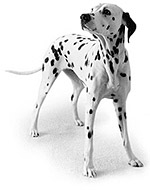


 Urolithiasis (urolith - urinary stone, -iasis - disease of) is a condition in which crystals in the urine combine to form stones, also called calculi or uroliths. These can be found anywhere in the urinary tract of dogs, where they cause irritation and secondary infection. Most end up in the bladder or urethra.
Urolithiasis (urolith - urinary stone, -iasis - disease of) is a condition in which crystals in the urine combine to form stones, also called calculi or uroliths. These can be found anywhere in the urinary tract of dogs, where they cause irritation and secondary infection. Most end up in the bladder or urethra.
Any breed can develop uroliths, but a genetic predisposition to producing crystals makes the development of stones more likely. Dalmatians in particular are prone to developing uroliths.
Dalmatians have a defect in the pathway that normally leads to the breakdown of urates, which are a by-product of protein digestion. This results in increased urate excretion in the urine (4 to 8 times that of other breeds) and predisposes the breed to the formation of urate crystals and, eventually, stones.
Other dog breeds predisposed to urolithiasis include Cocker Spaniels, Bichon Frise (Bichons), and Miniature Schnauzers (struvite stones - caused by magnesium ammonium phosphate); English Bulldogs (urate and/or cystine stones); Lhasa Apsos, Miniature Poodles, Miniature Schnauzers, and Yorkshire Terriers (calcium oxalate stones); English Bulldogs, Dachshunds, Newfoundlands, Irish and Scottish Terriers, and Irish Setters (cystine stones); and Cavalier King Charles Spaniels (xanthine stones).
It typically takes some time for crystals to form and combine into stones that cause problems, most often between 3 and 6 years of age. The signs you will see in your dog depend on where in the urinary tract the stones end up. They collect most commonly in the bladder, in which case you may see blood in the urine, difficulty and pain in urinating, and small but frequent amounts of urine.
If a stone completely obstructs the urethra and thus blocks the outflow of urine (more common in male dogs, which have smaller urethras), then these signs of discomfort will be magnified and your dog may also show signs of kidney failure – vomiting, depression, and/or loss of appetite.
Special diets low in purines (components of certain foods – primarily found in animal proteins – that metabolize into uric acid in the body), high in complex carbohydrates (whole grains, fruits, and vegetables help rid the body of extra uric acid), low in fat (fat holds onto uric acid in the kidneys), and moderately low in protein are recommended to help prevent the formation of urinary stones. (Low-purine diets for dogs are often similar in nature to those recommended for humans suffering from gout or kidney stones.) Nutritional supplements such as potassium citrates (for preventing calcium oxalate crystals) and sodium bicarbonate (for preventing cystine crystals) may also be encouraged.
In addition to paying careful attention to your dog's diet, you can help to reduce the formation of urinary stones by providing lots of fresh water and ensuring your dogs have regular and frequent opportunities to urinate, so that urine doesn't accumulate in the bladder (which allows time for stones to form). You can also increase your dog's water consumption by feeding a canned diet with a high water content or by mixing dry food with water.
Flint River Ranch has developed several premium pet food formulas that may be helpful in the possible prevention of urinary stones, including our Flint River Ranch DryWater premium moist pet food formula, our Flint River Ranch Lamb and Rice premium formula, and our lower-protein Flint River Ranch "Fish and Chips" Premium Pet Food formula with added fruits, vegetables, and essential fatty acids.
Seek veterinary treatment if your pet's condition worsens. With extra care and nutrition, your dog can be spared the pain of urinary stones.
Recommended Products:
Related Articles:
Related terms: Calculi, uroliths, low-purine diet, diets for Dalmatians (frequently misspelled as Dalmations), cystine crystals
Some of the information on urolithiasis courtesy of the Canine Inherited Disorders Database.
FAQs: Pet Health Risks and Remedies